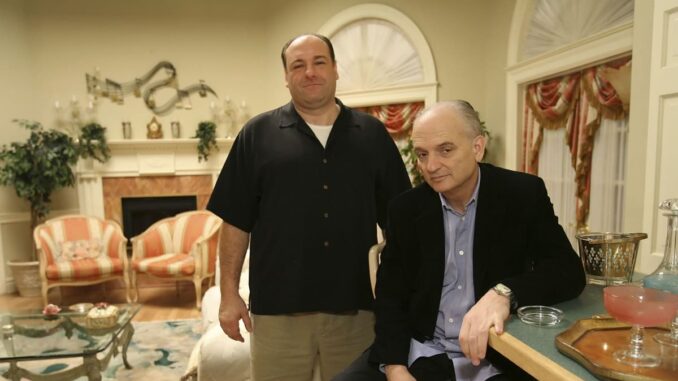
When we think about the evolution of television, one name looms large: The Sopranos. This groundbreaking HBO series, which debuted on January 10, 1999, didn’t just change the way we viewed mobsters; it transformed the landscape of TV drama itself. With Tony Soprano at the helm, the series redefined what a television show could be, paving the way for future hits like Mad Men, Breaking Bad, and Succession. In the upcoming documentary Wise Guy: David Chase and The Sopranos, directed by Oscar-winning filmmaker Alex Gibney, we dive deep into the legacy of this iconic series and explore how its creator, David Chase, shaped the very fabric of modern television.
The Cinematic Shift: Elevating TV Drama
From the outset, The Sopranos was anything but ordinary. It turned the idea of a mob story on its head by focusing not just on crime but on the emotional and psychological struggles of its protagonist, Tony Soprano, played to perfection by the late James Gandolfini. The series embraced a cinematic approach, with high production values, complex character arcs, and rich storytelling that blurred the lines between good and evil.
A New Era of Storytelling
According to Gibney, the initial vision for The Sopranos was ambitious. “Think about it from the standpoint of 1998,” he said. “You’re starting with a blank piece of paper.” David Chase sought to create something revolutionary, steering away from the formulaic nature of traditional TV shows. His focus on character depth and moral ambiguity made audiences rethink what they expected from a television drama.
The series wasn’t just about a mob boss; it was about a man grappling with identity, familial obligations, and personal demons. The narrative structure allowed viewers to witness Tony’s vulnerabilities, making him a more relatable and tragic figure. This exploration of character complexity was a game-changer, opening the door for future shows to delve into the intricacies of human nature.
The Relationship Between David Chase and James Gandolfini
One of the most intriguing aspects of The Sopranos is the dynamic between David Chase and James Gandolfini. Their partnership shaped Tony Soprano into a character unlike any seen before on television.
The Complexity of Tony Soprano
Tony was not just a mobster; he was a deeply flawed individual. Chase imbued him with brutal characteristics, stemming in part from his tumultuous relationship with his mother. “The ultimate beginning for all of us is our mother,” Gibney notes, emphasizing that Tony’s complex relationship with his mother drives much of his behavior. While Tony is outwardly tough and ruthless, he also exhibits moments of reflection and vulnerability, thanks largely to Gandolfini’s nuanced performance.
Gandolfini brought layers to Tony that made him compelling. “At times, he’s unaware of what an a**hole he’s being,” Gibney points out. “Other times, he’s very reflective.” This balance made Tony relatable, allowing viewers to empathize with him even when he committed heinous acts.
A Collaborative Creative Process
Their collaborative process was deeply personal, as seen in the documentary. Gibney highlights a pivotal moment when David had to respond to network notes about a critical scene. Chase insisted, “If he doesn’t kill that motherf*****… we’re not doing what I want to do.” This willingness to challenge conventional storytelling norms set The Sopranos apart.
The Role of Female Characters
Another groundbreaking element of The Sopranos is its portrayal of female characters, which is often overlooked in mob-centric narratives. Chase crafted strong, complex women who were not merely foils for the male characters.
Strong Women in a Man’s World
Dr. Jennifer Melfi, played by Lorraine Bracco, serves as Tony’s therapist and adds depth to the series. Her character challenges traditional gender roles by not succumbing to the typical tropes associated with a mob boss and his therapist. Melfi’s struggles, especially after her traumatic experience of rape, highlight the complexities of female agency in a male-dominated world. Rather than seeking revenge through Tony, she adheres to her moral code, showcasing strength and independence.
Edie Falco’s Carmela Soprano is equally compelling. She embodies the tension between loyalty and morality. Gibney points out that Carmela is a sympathetic character, yet she has made “her deal with the devil.” She grapples with her desires for wealth and security while navigating the moral complexities of her husband’s lifestyle. This complexity in female characters enriches the narrative, making them integral to the story rather than mere accessories.
The Last Episode: A Divisive Conclusion
The final episode of The Sopranos remains one of the most debated conclusions in television history. David Chase’s intentional ambiguity has sparked numerous interpretations and discussions. In Wise Guy, Gibney delves into the creative decisions behind this infamous finale.
Preserving the Mystery
Gibney reflects on his own experience watching the last episode, noting his initial shock but eventual delight. “It preserved the kind of discomfort that made you want to replay the show over and over again,” he explains. This lack of a neatly wrapped resolution allowed viewers to engage in discussions and theories, keeping the show alive in public consciousness long after it ended.
By refusing to provide clear answers about Tony’s fate, Chase preserved the series’ overarching themes of uncertainty and moral ambiguity. This decision challenged viewers to confront their own interpretations of justice, loyalty, and the consequences of one’s choices.
Conclusion: The Legacy of The Sopranos
The Sopranos reshaped television as we know it, setting a new standard for storytelling and character development. David Chase’s vision, combined with James Gandolfini’s unforgettable portrayal of Tony Soprano, created a narrative that remains relevant today. The show’s exploration of family dynamics, moral dilemmas, and the complexities of human behavior laid the groundwork for countless series that followed.
As we anticipate the release of Wise Guy: David Chase and The Sopranos, it’s clear that the impact of this groundbreaking series continues to resonate. It challenged conventions and forced viewers to rethink their understanding of morality, identity, and the human experience.
